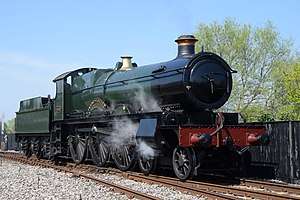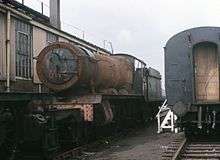GWR 2900 Class 2999 Lady of Legend
No 2999 Lady of Legend is a British steam locomotive completed in 2019 to the Great Western Railway's 2900 or "Saint" class design of George Jackson Churchward. Based on the frames and boiler of GWR Hall class 4-6-0 No 4942 Maindy Hall, it is the second completed "new-build" project, based at Didcot Railway Centre in Didcot, Oxfordshire. Described as "building the 78th Saint", the project started in the 1970s to look at building a new 'Saint', since none of the original class-members were preserved.
| GWR 2900 Class 2999 Lady of Legend | |||||||||||||||||||||||||||||||||||||||||||||||||||
|---|---|---|---|---|---|---|---|---|---|---|---|---|---|---|---|---|---|---|---|---|---|---|---|---|---|---|---|---|---|---|---|---|---|---|---|---|---|---|---|---|---|---|---|---|---|---|---|---|---|---|---|
 2999 Lady of Legend at Didcot in April 2019. | |||||||||||||||||||||||||||||||||||||||||||||||||||
| |||||||||||||||||||||||||||||||||||||||||||||||||||
| |||||||||||||||||||||||||||||||||||||||||||||||||||
| |||||||||||||||||||||||||||||||||||||||||||||||||||
| |||||||||||||||||||||||||||||||||||||||||||||||||||
Maindy Hall

No. 4942 Maindy Hall was a 4-6-0 locomotive of the GWR's 4900 Hall class. It was built in 1929 at Swindon. After being withdrawn from service in 1963, it was moved to Woodham Brothers scrapyard in Barry, Vale of Glamorgan, South Wales, in 1964 and was bought by the Didcot Railway Centre in 1974, who also bought 5900 Hinderton Hall.
The Saint project
Following the formation of the society in the 1970s a plan was formed to build a new 2900 Saint, since none of the original class members were preserved (the last class member being no 2920 Saint David which was withdrawn from service in October 1953 and was sent straight for scrap).
It was decided to rebuild 4942 Maindy Hall from scrapyard condition (there being another ten members of the 4900 Hall class in preservation). This is appropriate as the original 4900 class prototype of 1925 was converted from 2900 class engine Saint Martin. It was also decided (like 60163 Tornado) to number the locomotive as a new member of the class, sequential to the highest-numbered original Saint, No.2998, Ernest Cunard.
The original driving wheels for the Hall were 6 feet (1.8 m) in size while the size of the driving wheels for a Saint were 6 feet 8 1⁄2 inches (2.045 m), the front bogie wheels were also smaller than those for a Saint as they were 3 feet (0.91 m) and the front bogie wheels for a Saint were 3 feet 2 inches (0.97 m). Some of the parts used in the construction of 2999 are original Saint parts, including a connecting rod from 2906 Lady of Lynn and the whistle from 2910 Lady of Shalott. The chimney is also an original part, but is from a 6800 class 4-6-0. The engine was built in the original form, with straight frames and lever reversing gear; these engines were named after historical, mythological or poetical 'Ladies', which corresponds with the name Lady of Legend chosen for 2999.
The original height of the 2900 Saints was 13 feet 3 1⁄2 inches (4.051 m), but the maximum height allowed for steam locomotives to work on the mainline by Network Rail is 13 feet 1 inch (3.99 m), because of overhead line clearances. The height of 2999 was therefore reduced, to allow it to operate on the mainline. Mainline operation also requires the additional equipment that none of the original members of its class had, including: AWS (A similar system called ATC was used by the GWR), TPWS, OTMR & GSM-R. A speedometer would also need to be fitted to the loco as when outshopped the locomotive wasnt fitted with one. However a later decision from Didcot regarding the ceasing of mainline running means that the engine will only see use at Didcot and on other heritage railways in the foreseeable future.
Naming 2999
Many names were submitted in a competition run by the group which were constructing 2999[1] and the name eventually chosen was Lady of Legend. Other names that were submitted in the competition to name the new engine included: Lady in Waiting, Lady Diana, Lady of Lourdes, Saint Dai, Maindy Court (reference to donor loco 4942 Maindy Hall), Prince Charles, John Betjeman & Phoenix.
Atlantic option
An integral part of the Saint project is the 'Atlantic option'. Although it is intended by the Saint project that the completed engine will run primarily in its 4-6-0 configuration as a Saint because of the plan to go mainline, it is planned to have the engine run for a period during its 10-year boiler certification as a 4-4-2 Atlantic. The number it is expected to carry when converted into its 4-4-2 Atlantic form is 191 and the names include Atlantic and Churchward. This mirrors the original Saint class of which 13 were built as 4-4-2s for comparative purposes and later converted to 4-6-0s.